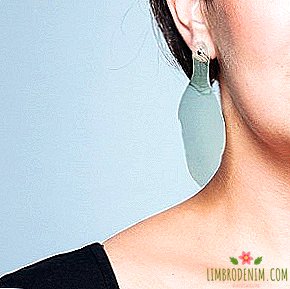"This is not a job": I was an egg donor
Today is forty years old Englishwoman Louise Brown - the first person born thanks to IVF technology. Now IVF is perceived, if not as routine procedures, then at least as a familiar area of medicine. One of the important elements of reproductive technology is egg donation. It is treated differently: some consider it to be an effective way to cope with infertility, others say that it is the exploitation of the body of a female donor. We talked to Veronica, who was an anonymous egg donor three times, then she herself became a specialist in recruiting donors, and then an IVF patient.

Desire to help
The first time I became a donor ten years ago, when I was twenty-four years old. I had medical insurance from work, which I could apply to a large private clinic. I found out on their website that they are looking for egg donors. I didn’t have an acute need for finance, but I was attracted by the interest in the procedure and the opportunity to help someone. The fact that we went on vacation with my family for a compensation of thirty thousand rubles was a pleasant addition.
My husband supported me; I did not tell about this to other family members. Friends and acquaintances treated differently. Some categorically said: "What are you, stupid?" - even not wanting to delve into the essence of the procedure, others supported and then became donors themselves. Nice to know that most of the former opponents have changed their opinion. Until now, the main controversial moment for many is religion: world confessions cannot yet figure out whether they approve in vitro fertilization or not.
I decided to become an official donor, and not to look for couples with infertility in social networks because of fear. How will I be legally protected if additional medical support is needed or material costs incurred? When the donor contacts the patient directly, all financial problems, if any complications arise, fall on the shoulders of the patients - and they may refuse to pay the donor for such services. Who knows how potential parents will behave? This is a great psychological burden. A donor, inspired by the desire to help, may encounter various negative emotions of the couple: jealousy, envy, disbelief. And without that complex relationship will turn into hell. The clinic acts as a buffer between the donor and the couple: it accompanies those and others in all difficult moments - both medical and psychological. At the same time, it allows you to transmit positive emotions: anonymous letters of support from the donor, a letter of thanks and gifts from patients. And of course, the clinic is responsible for the life and health of the donor after the donor protocol (a set of procedures that must be performed when working with a donor. - Approx. ed.).
Who knows how potential parents will behave? This is a great psychological burden. A donor, inspired by the desire to help, may face different negative emotions of the couple: jealousy, envy, disbelief
To become an oocyte donor (ovum. - Approx. ed.), you need to be a healthy woman without serious hereditary diseases. Previously, there was another requirement - to have your own child without genetic diseases. When I first became a donor, I already had a four-year-old son. In 2012, a Russian law was amended, and now a woman who has not given birth may become a donor. Nevertheless, clinics recruit mostly young mothers, because patients are more likely to choose a donor who already has a child.
I eat right, do not drink, do not smoke, at that time took contraceptive drugs, so I didn’t have to change anything in my lifestyle. The appointment of hormonal contraceptives is a common requirement for the donor: they are needed to synchronize the cycle with the patient's cycle. Also during the donor protocol, it is important to follow a protein diet, because growing eggs require a lot of protein. Vegan donors drink protein shakes.
But morally to the donation, I was preparing for a long time. I re-read everything I found on the Internet in Russian about egg donation (and the information was then very scarce). Even now, people often do not see the difference between surrogate motherhood and egg donation. The situation on the English-language sites was better, but most of all I learned from the doctor at the consultation.
Injections and hot chocolate
Before a donor is taken eggs, it will have hormonal stimulation. It is necessary in order to ripen not one (which happens normally every month), but several eggs that are potentially released in this menstrual cycle. Hormonal stimulation lasts ten to twelve days, at which time women are given subcutaneous injections in the abdomen. In parallel, the doctor does several ultrasound examinations to monitor the situation. The shots are practically painless - the needle is very thin, - only those who are afraid of injections are generally uncomfortable. The first times the drug is administered by the nurse, and then the patients themselves usually continue — this is easy and convenient due to the syringe pen. In the process of preparing for the fence, the mood may change, but only slightly: I can count on the fingers of one hand girls who have noted such a side effect. Usually, the shots also do not affect the weight, but often the libido increases.
The eggs themselves are taken on an empty stomach under general anesthesia, the procedure lasts only ten to fifteen minutes. Everything is monitored with an ultrasound transducer, and an ovary is punctured through the vaginal wall. Puncture is a medical procedure: the vaginal wall is pierced with a special hollow, thin needle with which eggs are taken. This method avoids incisions in the abdominal wall. After puncture, a short sleep and a medical examination, hot chocolate is brought to the donor in the ward so that her strength recovers more quickly. In a few hours you can go home. It is desirable that the donor be met by someone from the family, especially since you can't get behind the wheel yourself.
Two female recipients did not manage to become pregnant. But the third born twin girls. It matters to me that I was able to help those who needed it.
Day after the procedure it is important to observe bed rest - this is necessary to prevent possible health risks. There may be two. The first is ovarian hyperstimulation, according to statistics from our clinic, it occurs in about 5-7% of patients. This condition may occur due to the fact that the drugs too much affect the growing follicles - this leads to the fact that the ovaries can increase in volume, the blood becomes more dense, diuresis is disturbed (the amount of urine excreted over a certain period of time. - Approx. ed.), there are swelling. The syndrome has varying degrees of severity: both minimal treatment and hospitalization may be required. More common is the mild form of hyperstimulation, which helps with the course of droppers. The second risk is internal bleeding, as with any surgical intervention. It is very rare, according to statistics from our clinic, in about 2% of patients.
Often donors are worried about deferred risks that may arise over many years. I am in a closed community of oocyte donors on Facebook from different countries, I spoke with American women who were donors eighteen years ago - as far as I know, they did not have any health problems associated with egg donation (There were no large long-term studies on the health status of donors after the procedure; therefore, it is impossible to speak unequivocally about the impact of donation on health. - Approx. ed.).
In the next two years I became a donor twice more. Unfortunately, out of my three donor programs, two female recipients did not succeed in becoming pregnant. But the third born twin girls. It matters to me that I was able to help those in need.

Own and other people's children
I don't have the feeling that “my” children live somewhere else. From opponents of donation, I heard: "How can I give my children?" Typically, these women are very surprised when you explain to them that every month during menstruation they lose "their children" in the form of unfertilized eggs.
A donor can participate in programs several times, so the eggs of one woman can go to different patients. This does not mean that different parents give birth to children, similar to the same donor. An egg cell is only half the set of genes for a "whole" person. In order for an egg to become a child, she needs to get the second half of the genes from the spermatozoon, then a woman takes out it for nine months. How can you then say that this is "my" child?
I have two children: my son is fourteen years old, my daughter is a month and a half. I know that those who got my eggs, were waiting for the children, that they also went through all the stages of motherhood. Once another donor told me: “It happens when a man conceives a child and does not know about it. This is an example of irresponsibility. In egg donation it is different: the donor does not know the future mother, there is no sexual contact, but there is a couple who dream about it child, and all parties approach this most responsibly. "
In order for an egg to become a child, she needs to get the second half of the genes from the spermatozoon, then a woman takes out it for nine months. How can you then say that this is "my" child?
Over the past years I have become not only an egg donor, but also an IVF patient. I have been married for fifteen years, our son is fourteen, and we could not even imagine that the problem of infertility could touch us. Four years ago, we started planning our second child, but after a year of unsuccessful attempts, we went to the doctor and identified the cause - the male factor. After eight years of harmful work in the metropolis, her husband's spermogram performance dropped dramatically, we had about 2% chance that pregnancy would come naturally.
Often patients tell me: “I know that I will have to test the donor during the donor program, I have gone through IVF many times, it was very hard for me, I felt very bad. I am sorry that she will have to go through all this to help us” . I can confirm this: it is psychologically very difficult to undergo IVF. You want everything to be natural, without medical interventions and suffering, and this creates tremendous emotional pressure. When you're a donor, everything is diametrically opposite. For me, as for other donors, the procedure was easy emotionally, since the main goal was the result of the patient. When you are a donor, you are most often a mother who is ready to help another woman become a mother. The donor does not have the burden of infertility on his shoulders, there is only the desire to be useful.
When I was an IVF patient, it took me two stimulations and punctures and four attempts to end up with our long-awaited daughter. The son says that it is not a miracle, but simply the result of an excellent scientific work - I add that only science can work real miracles.
Not work
Thanks to medical and technical progress, the use of assisted reproductive technologies is improving: forty years ago, pregnancy occurred in about 12% of cases, today this figure is higher. Unfortunately, there is still a lot of couples needing donor eggs or sperm.
I have two higher educations: a cultural expert and a translator from English. Now I manage the donor department in the clinic, where I was once a donor. I have been working here for eight years and most of the time I am recruiting egg donors. This is not taught anywhere, but donor experience, of course, helps.
According to the law, in Russia, relatives of patients or anonymous people with whom she does not know can become egg donors. We work only with anonymous donation. Typically, the patient has a number of requirements for appearance, education and other parameters of the donor - for this, the latter fills in a detailed questionnaire. The patient can request from us a child or adult photographs of the donor. We always select a donor individually so that she is as close as possible to the expectant mother. It's nice when patients come back for the second child and you see the result of the work - surprisingly similar to the parents of the child.
When you are a donor, you are most often a mother who is ready to help another woman become a mother. The donor does not have the burden of infertility on his shoulders, there is only the desire to be useful
The secret of successful recruitment of donors is in careful selection and verification of information. At the first stage, we mainly look at the social network: a potential donor who has contacted us can be told a lot by her interests and photos. Women who lead an unhealthy lifestyle, who have addictions, are quickly eliminated. Then there comes a long stage: the donor fills in a huge questionnaire, is examined from various doctors, collects certificates and passes tests. We talk for a long time and learn a lot of details about the life and health of a woman and the condition of her relatives. Ultrasound screening out girls with low ovarian reserve: donation requires a good supply of eggs. Only surveyed donors between the ages of eighteen and thirty years old get into the database; we initially invite you to become a donor up to thirty years.
Donation is not a job. Communicating with donors, I made an important conclusion: none of them would agree to go through the donor program exclusively for money. The fact that the donor helps others is an important part of motivation. When they pay solid compensation (now in our clinic it is ninety thousand rubles), many may mistakenly count donation to earn money. Those who pursue profits can hide health problems. Often, those who need money turn to us in the hope of quickly resolving a money issue - but a program can wait a long time, sometimes more than a year. Most women become donors for the first time because of material compensation, but they continue from altruistic convictions because they plunged into this atmosphere, received an anonymous thank-you letter from the couple - it is very important to know about the result of the help.

Parents choose
For future parents, too, impose certain requirements. The age of a woman who can become a recipient of an egg cell is from eighteen years to fifty-one years old, the age of men is not limited. Potential parents should have medical documents confirming that they are physically and psychologically ready for such a serious step. Oocyte donation is not only addressed by the male and female couples, no matter whether they are married or not. Among our patients there are single women and lesbian couples, where one woman is undergoing treatment. However, the overwhelming majority of potential parents are over forty couples with a good education and material condition, who sometimes have ten to fifteen unsuccessful IVF attempts with their own eggs. Our clinic works mainly with foreigners. For them, treatment in Russia is cheaper, and in some countries egg donation is prohibited, so potential parents are forced to seek treatment abroad.
A donor has the right to know only whether the pregnancy has occurred, whether the child has been born and its sex is an international standard. On average, ten to twenty eggs are obtained from a donor per program — but the patient can choose a cheaper program for six eggs. The cost of programs for patients varies from about three to twenty two thousand euros. Different programs provide different guarantee packages. For example, one of them guarantees the "birth of a healthy child." If this condition is not satisfied for the three donor protocols (mean attempt. - Approx. ed.), the contract provides for the return of money to the patient. Also among the services there is a genetic diagnosis of embryos, which allows to find out if the embryo has serious genetic pathologies before it is introduced into the patient's uterus. During the test, the floor of the embryo becomes known. Some patients go for this examination for the sole purpose of knowing in advance whether they will have a son or a daughter. From this year, for ethical reasons, the European Union refused to select embryos on this basis, because the priority should be the health of the unborn child, it does not matter whether it is a boy or a girl.
Photo: NARUEDOL - stock.adobe.com (1, 2)





